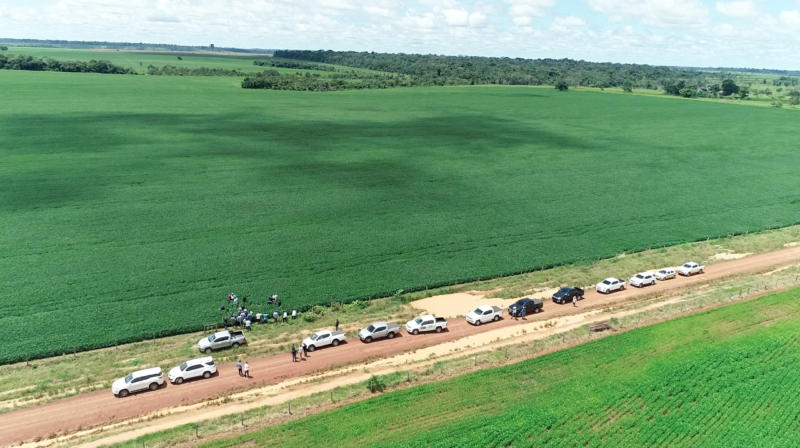RIO DE JANEIRO, BRAZIL – In 2020, the Jair Bolsonaro government approved the largest number of agrochemicals in history: 493 new products were released, 19 more than in 2019, another record-breaking year. This means that about one-third of all pesticides in the Brazilian market were approved under the Bolsonaro government.

Experts discussed how new agrochemical approvals work in Brazil and how they impact people’s health and the environment.
Why are so many agrochemicals approved in Brazil?
Brazil is one of the largest monoculture producers in the world, that is, the country is among the largest single-crop producers, soy being the main one. By making heavy use of fertilizers, such as NPK (nitrogen, phosphorus, and potassium), monoculture renders crops more vulnerable to pests, which in turn requires more agrochemicals. This is what the Trophobiosis theory says.
“In addition, this type of agriculture typically uses very heavy machinery, which compacts the soil, leading to the development of fungi,” explains Larissa Mies Bombardi, a professor at the University of São Paulo.
“It’s a model in which fungi and insects will be present. So it will ultimately require agrochemicals,” adds the researcher and author of the ‘Atlas Geográfico do Uso de Agrotóxicos no Brasil e Conexões com a União Europeia’ (Geographic Atlas of Pesticide Use in Brazil and its Links to the European Union).
The problem does not necessarily lie in the approval of these products, as Rafael Junqueira Buralli explains, researcher in the University of São Paulo and author of the thesis ‘Health impacts of environmental and occupational exposure to agrochemicals for agricultural use’, but rather in the approval of pesticides that have already been banned in other countries due to their high toxicity (damage to health and the environment).
Another problem is the failure to review products already approved, which leads to an accumulation of agrochemicals in the market.
What do we know about these new approved agrochemicals?
Some were already authorized in Brazil and can now be marketed under another name by other companies. Others are new combinations of substances that were already authorized, which according to Bombardi is quite serious, since little is known about the impacts of these new combinations.
Others had never been authorized in Brazil and were already banned in other countries. One of them is dinotefuran, which was banned in the European Union because of its many negative environmental impacts. Dinotefuran is associated with the death of bees, which are major pollinators and contribute to 90 percent of the world’s food production.
Why do we use the European Union as a parameter?
According to Buralli, the parameter is usually the one with more stringent legislation and regulations than ours: “How can a product that the European Union has rejected for being too toxic be approved in Brazil?”
Agrochemical poisoning can cause dizziness, vomiting, breathing disorders, skin rashes, blindness, convulsions, fainting, and even death. There are also studies investigating the link between agrochemical exposure and the incidence of cancer.
What is the difference between agrochemicals and pesticides?
None. The term agrochemical emerged in 1977 after the publication of the book “Pests, Pesticides and the Environmental Crisis: Problems and Solutions” by Adilson D. Paschoal, an agronomist and professor at the University of São Paulo.
Pesticides were a way for the market to downplay the negative impact.
Despite the existence of a bill that, among other things, aims to extinguish the term agrochemical, professor Larissa Bombardi points out that the use of this term is important because it alerts the population about the dangers of these products.
“The term agrochemical is a civil society achievement. When you refer to pesticides, the word suggests something lighter. So, using this term is problematic,” she says.
Would it be possible to feed the whole Brazilian population without using agrochemicals?
According to Bombardi, yes, it would. “In fact, when agrochemicals first emerged, the technology promised to solve the problem of hunger. But this problem continues to exist. There is a vast scientific literature that shows, for instance, that agroecology is as or more productive than conventional agriculture, which demands agrochemicals,” she explains.
Moreover, according to the IBGE (Brazilian Institute of Geography and Statistics), 70% of the food that reaches the population’s table comes from family farming, a more sustainable and diversified agricultural model that can be productive without toxic substances.
Should we then abolish agrochemicals?
“I believe so, but I understand that we can’t do it overnight, we would have to undergo a transition process,” says Professor Bombardi. In her opinion, these measures are pressing and include what is already being done in the European Union with the reduction in agrochemical use.
To this end, Bombardi believes that we could eliminate products which are banned in other countries.
Regarding the use of agrochemicals, education plays a crucial role, because we know that environmental awareness is achieved through education.
Banning aerial spraying on a national scale, something that has already occurred in the state of Ceará, would be another step.
Source: UOL

